Automatic Call Distribution Software
Automatic Call Distribution Software
Handle high volume of phone calls with our seamless call routing solution. Automatically route incoming calls to the right agents and provide exceptional customer support from the get-go. Leave no call unanswered and no customer unsatisfied.
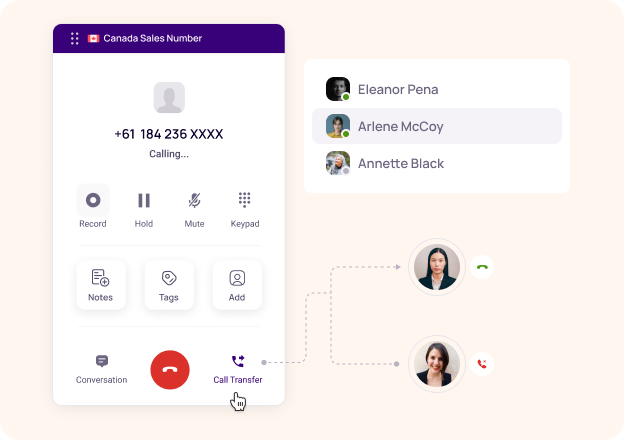
Get Automatic Call Distribution Software for your Cloud Call Center
Trusted and loved by 5500+ companies worldwide













































How to Set Up a ACD for Your Call Center?
Go through the following steps to set up Automatic call Distribution software. Once the setup is complete, you can automatically route the calls to the right agents.
- Choose the right ACD solution.
- Add and configure team members.
- Define call routing strategies.
- Assign right agents to route the calls determining the condition.

Essential Features of Automatic Call Distribution Software
Unlock awesome features in your custom local phone number to upgrade your business communication.

Why Choose KrispCall’s ACD Software?
Easily
Integration With Your Favorite Business Tools
No more juggling multiple tools! Seamlessly integrate your favorite business tool and access all the features you love in one place.






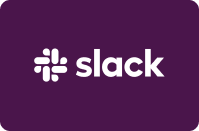


Testimonial
Call Center Managers' Experiences with KrispCall
Many of our customers have local telephone number from KrispCall. To find out why, these were the recurring themes.
What is Automatic Call Distribution?
Automatic Call Distribution (ACD) is an intelligent call routing system designed to distribute incoming calls effortlessly and ensure they are routed to the right agents with lightning speed.
It is the ultimate game-changer for call centers to handle large volumes of calls and eliminate lengthy hold times. With ACD, calls are distributed based on predefined rules, ensuring seamless customer experiences.
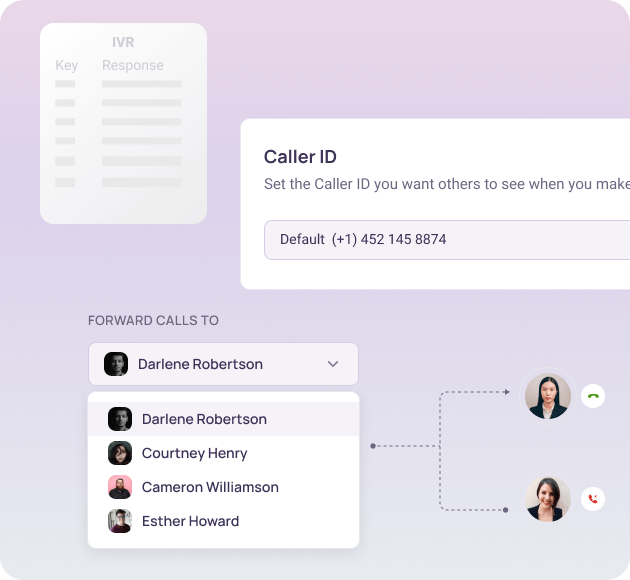
Differences Between IVR & ACD
| Interactive Voice Response (IVR) | Automatic Call Distribution (ACD) | |
|---|---|---|
| Function | Call distribution feature that interacts with callers through voice or keypad responses to route calls or provides a self-service menu. | Call distribution system that manages and distributes incoming calls to the most appropriate agents based on predefined rules and agent availability. |
| Purpose | Provide self-service options, gather caller information, and route calls based on predefined menus or options. | Efficiently distribute incoming calls to available agents, ensuring prompt and personalized customer service. |
| Agent Interaction | IVR systems handle calls without agent involvement but may transfer calls to agents if required or requested by the caller. | ACD systems work in conjunction with agents, providing them with relevant caller information and routing calls based on agent availability and skills. |
| Personalization | Limited personalization as IVR menus is typically pre-recorded and follows predefined scripts. | Offers personalized call routing based on caller information or preferences and connects customers with the most appropriate agents for their needs. |
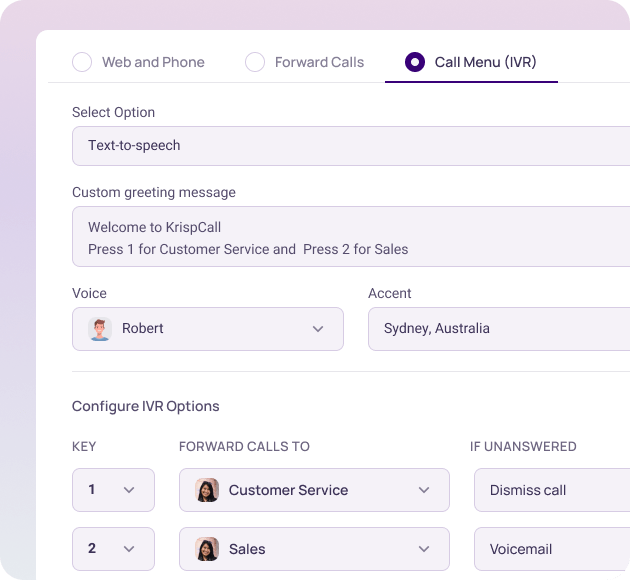
How Does ACD Work?
When a call arrives at the call center, the ACD system receives the call and begins the routing process. The process includes 3 major steps:
Types of Automatic Call Distribution
A classic method of routing incoming calls in a round-robin fashion to available agents. When a call arrives, it is assigned to the first available agent. Subsequent calls are then distributed to agents listed in sequential order. The sequence repeats once all agents have received a call.
Routes incoming calls to available agents based on a predefined list. Each call is directed to the agent at the top of the list, and if the agent is unavailable, it moves to the next one. This method allows for intentional agent prioritization or hierarchy within the call center.
Incoming calls are routed simultaneously to multiple agents or extensions at the same time. When a call arrives, the phones of all available agents ring at once. The call is typically answered by the first available agent while the other agents’ phones stop ringing.
A typical method that allocates incoming calls to agents based on their available talk time. The ACD system tracks the average call duration or the accumulated talk time of each agent. When a new call arrives, it is routed to the agent with the least talk time.
Directs incoming calls to the most suitable agents based on their specific skills, knowledge, or expertise. When a call arrives, it is routed to the agent who possesses the relevant skills to handle the specific call type or customer inquiry.
Distributes incoming calls based on predetermined time parameters or scheduling criteria. The system considers factors such as business hours, peak call times, and agent availability. Calls received during designated time frames are routed differently to adapt to varying call volumes.
Distributes incoming calls to agents during periods of their inactivity or idle time. The ACD system identifies agents who are not currently engaged in an active call or task and routes incoming calls to them.
Dynamically routes incoming calls to the most appropriate agents based on caller information, IVR selections, agent skills, availability, call volumes, waiting time, and other relevant data. Evaluates available agents and real-time conditions to determine the best path for each call.


Benefits of Automatic Call Distribution in Call Centers
Top 10 ACD Software Providers

You can choose from an extensive range of virtual phone numbers at KrispCall. With more than 100+ countries to choose from, you can buy vanity, toll-free, and local numbers, and international numbers. Get the phone numbers that best suit your business best. Also, You can choose from a set of custom numbers in the starting and ending points of the number such as +1XXXXXXXX999, 888XXXXXXX.
1. KrispCall
KrispCall is a modern and advanced cloud telephony system that offers automatic call distribution (ACD) software. It is built with an automatic calling mechanism that allows call centers to handle large volumes of calls from a single app.
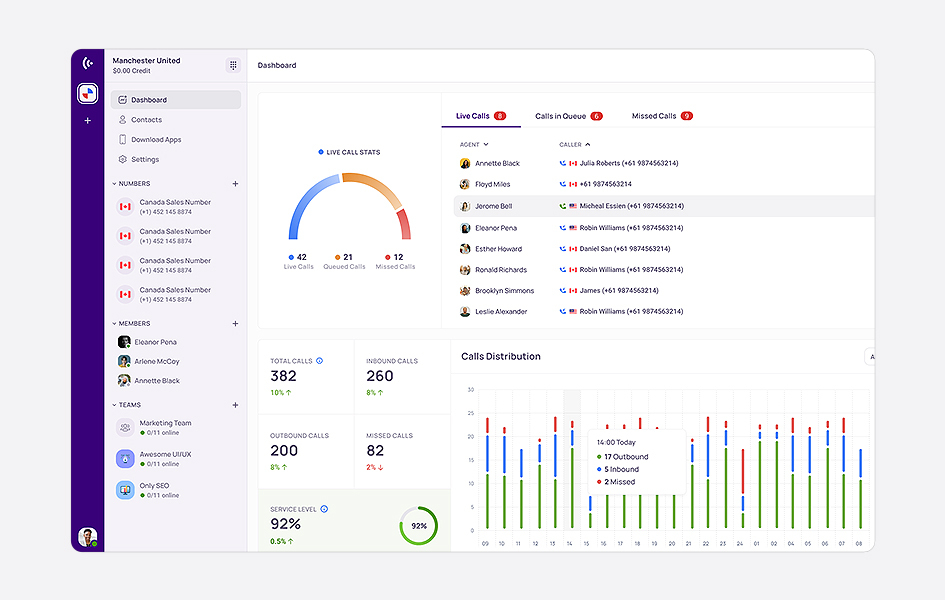
Krispcall’s ACD software has IVR capabilities allowing call centers to incorporate virtual receptionists into their system. This function automatically receives inbound phone calls to reduce missed call rates, and routes calls to the preferred agent based on the caller’s request.
It provides virtual phone numbers for over 100 countries which is a bonus for call centers targeting customers from multiple countries. These numbers are a great addition to ACD to recognize the country and the language of incoming calls and route them to the most appropriate agent.
Feature
Pricing
Pros
Cons
2. Ameyo
Ameyo is a comprehensive customer engagement and contact center software solution. It offers an Automatic Call Distributor system as part of its call center service. Trusted by over 60+ countries, its ACD utilizes advanced algorithms to route inbound calls and increase First call resolution (FCR).
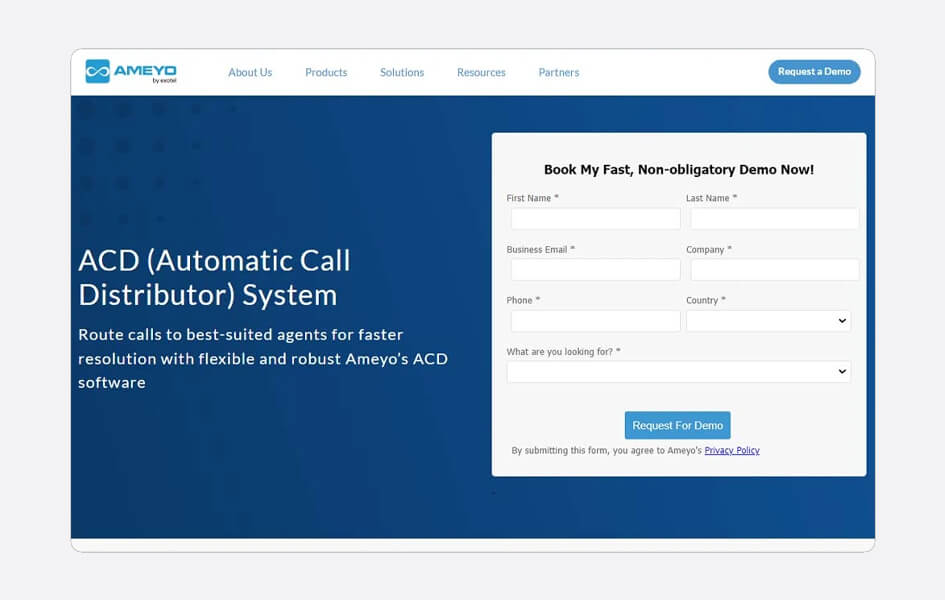
Ameyo explores personalized customer experience with the help of past interactions, caller preferences, and IVR selections to provide quick responses to callers. It uses defined campaign-level routing rules to route phone calls from one call center campaign to another effortlessly.
Feature
Pricing
Pros
Cons
3. TalkDesk
Talkdesk is a cloud-based phone service platform that offers an Automatic Call Distribution (ACD) system as a key component of its contact center software. Its ACD software offers real-time monitoring, queue management, and customizable routing strategies.

Talkdesk’s ACD is designed to eliminate unnecessary call transfers, prevent extended customer hold times, and increase first-call resolution rates. It uses AI tools for finding behavioral patterns and offering customers intelligent recommendations to better customer experience.
Feature
Pricing
Pros
Cons
4. Genesys
Genesys is a cloud-based customer experience platform that offers Automatic Call Distribution (ACD) capabilities as part of its contact center solutions. With an intelligent ACD, businesses can lower their average handling time by a large margin. It also reduces the overall operational costs of the process.
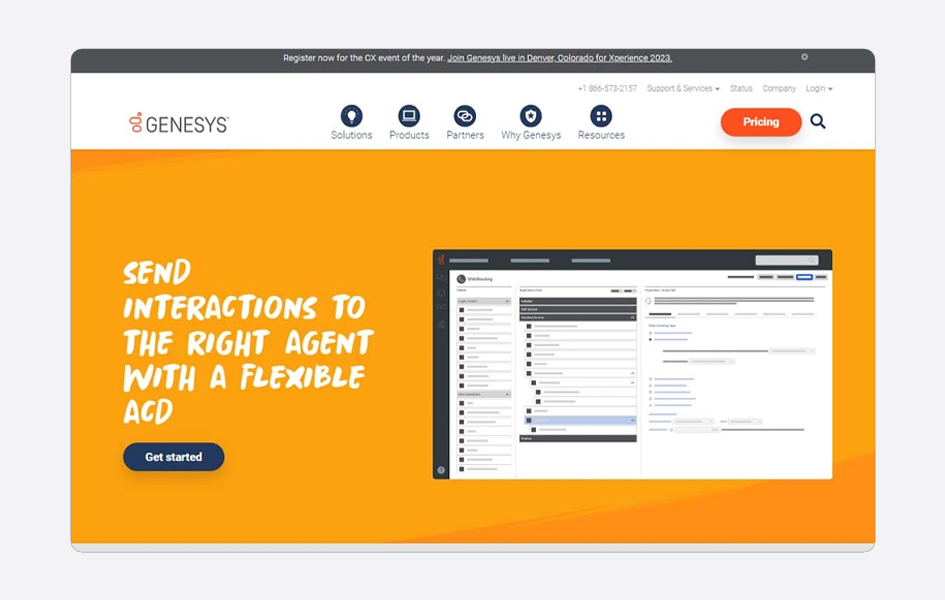
Genesys enables Automatic call distribution contact centers to improve their resolution rate, reduce waiting time, and avoid multiple call transfers. Virtual agents can dynamically link multiple cohorts according to their location and expertise.
Feature
Pricing
Pros
Cons
5. Vonage
Vonage is a cloud-based Automatic Call distribution (ACD) solution for call centers. It delivers positive customer experiences by connecting calls to the best available agent through Skills-based routing.
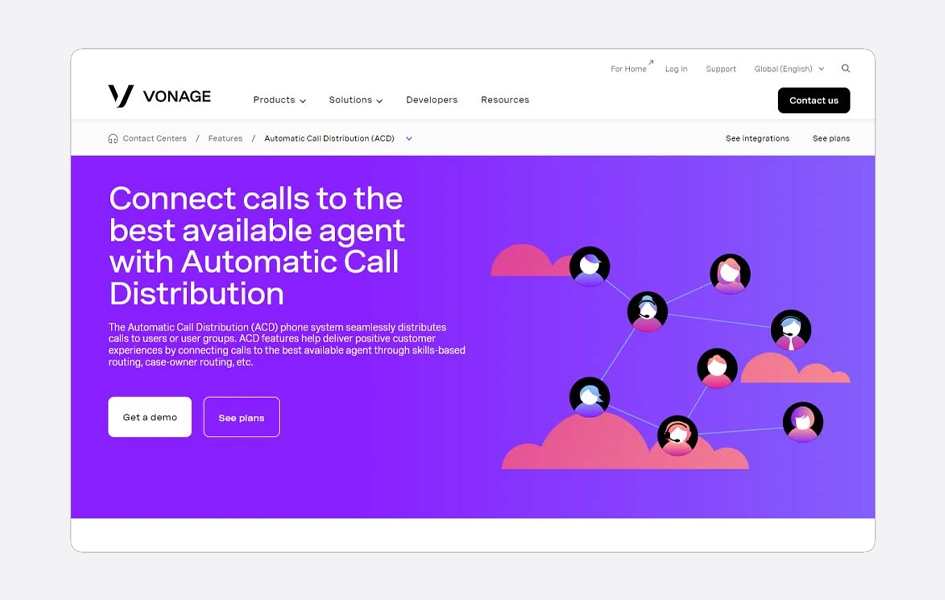
Vonage’s ACD helps optimize call handling, reduce wait times, and enhance overall customer interaction. It prioritizes the quickest route and shortens the waiting time to streamline business operations in call centers. It conducts real-time training and monitoring for better call-handling processes.
Feature
Pricing
Pros
Cons
6. RingCentral
RingCentral is a cloud communications and collaboration solutions provider. It offers an ACD (Automatic Call Distribution) system for contact centers. Integrating ACD with other RingCentral features can significantly enhance workforce management and customer satisfaction within contact centers.
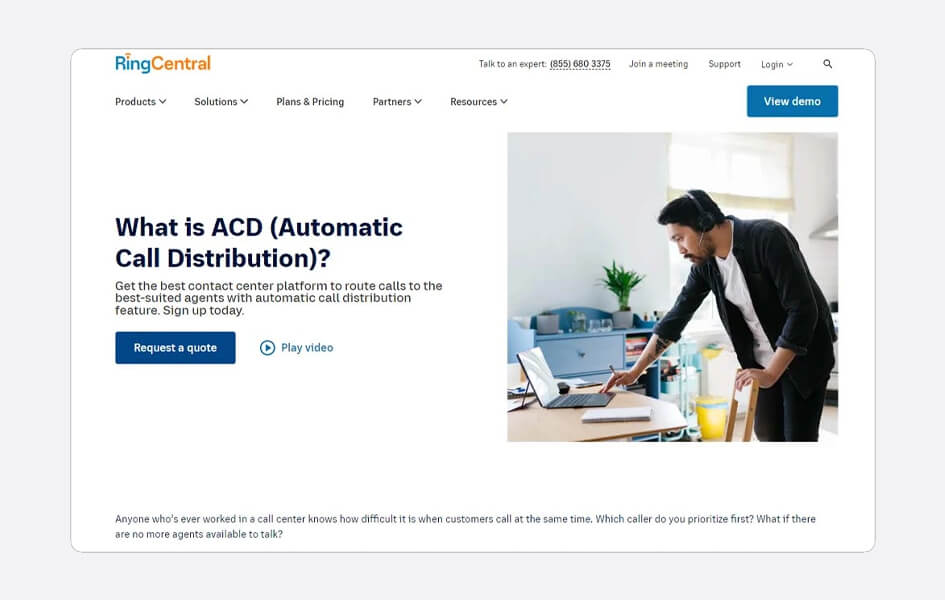
RingCentral’s platform includes team messaging and collaboration tools, allowing call center agents to communicate, share files, and collaborate in real-time. This can be handy when an inbound call is transferred from one agent to another. It also delivers high-definition video conferencing for better customer service.
Feature
Pricing
Monthly
Annual
Pros
Cons
7. 8×8
8×8 is one of the top-tier cloud communications and contact center providers. It provides a skilled-based Automatic Call Distribution solution for small-to-large businesses. 8×8 ACD handles advanced routing capabilities for different communication channels.

8×8’s ACD system is equipped with a user-friendly administration interface, enabling businesses to respond to any customer inquiry effectively. The administration interface also provides real-time monitoring and reporting capabilities. Contact center managers can easily track call volumes, wait times, and agent performance through intuitive dashboards and reporting tools.
Feature
Monthly
Pricing
Annual
Pros
Cons
8. Bitrix24
Bitrix is one of the popular free automatic call distribution software in the market for SMBs and call centers. Its ACD follows two main distribution mechanics: even distribution and simultaneous distribution. Currently, it doesn’t provide skill-based distribution.
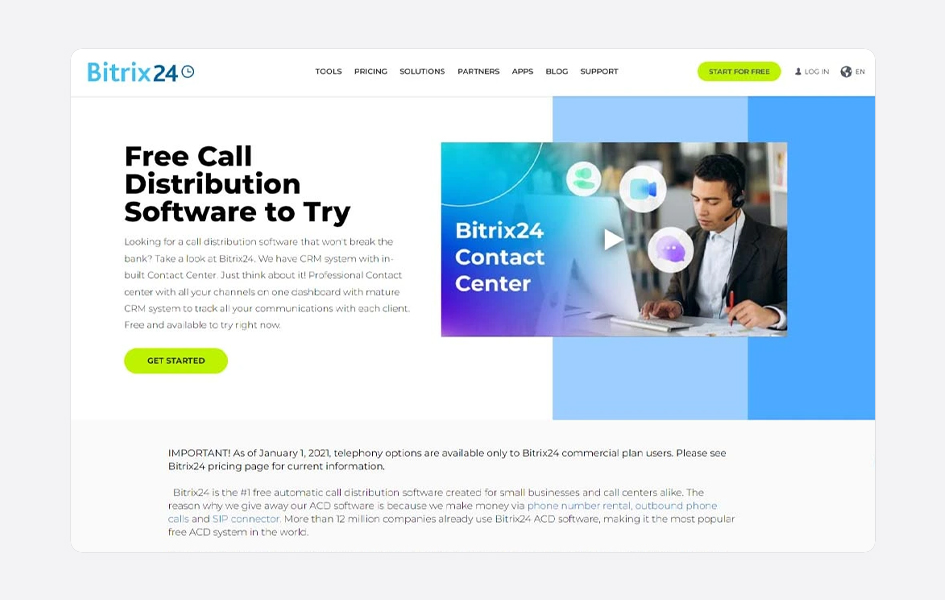
With intelligent call routing, Bitrix automatically identifies old or new callers and then routes calls accordingly. It significantly reduces the call waiting time and allows agents to greet the calls by their real names.
Feature
Pricing
Monthly
Annual
Pros
Cons
9. Avoxi
Avoxi is an all-in-one cloud communication tool with Automatic call distribution (ACD) functions for call centers. It allows businesses to personalize auto-call routing rules and multiple IVR menus as per their needs. Also, call centers can add call queueing, advanced analytics, automatic callback, and other features for free.
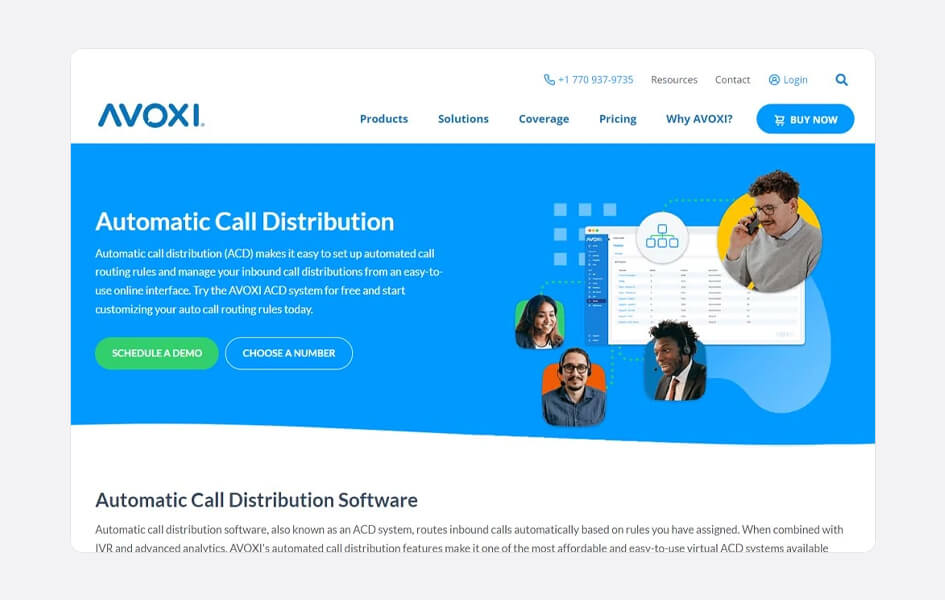
With a wide range of 160+ countries, businesses can get any virtual phone number from any country for their ACD system. Avoxi integrates with various CRM and business tools, allowing businesses to streamline workflows and access customer information during inbound calls.
Feature
Pricing
Pros
Cons
10. Freshdesk
Freshdesk is a cloud-based customer support software that provides a top-of-the-line ACD system for contact centers. It incorporates the IVR with ACD to efficiently handle large call volumes at a minimum operational cost.
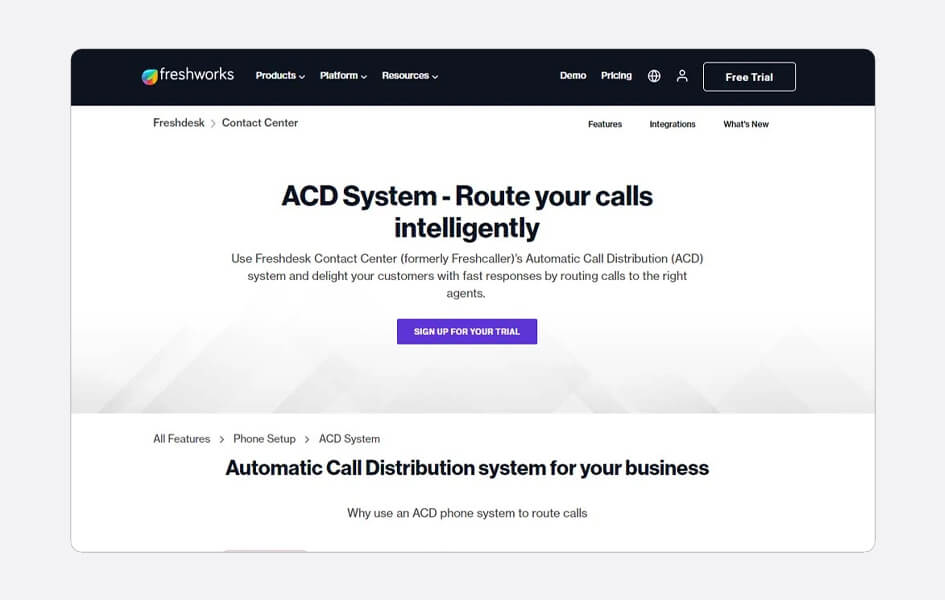
Freshdesk supports Most Idle Agent routing, Business Hours Routing, and Holiday Routing to route calls. With Smart Escalations, call centers will have fallback options that make sure no calls get unanswered. The call queue back option enables call center agents to give a callback to callers instead of letting them sit in the queue during peak hours.
Feature
Pricing
Pros
Cons
How to Choose the Best ACD Software for Your Call Center?
Follow the steps to choose the best ACD software for your call center in a quick time.


Embrace ACD Software & Automate Call Management!
Use ACD to automatically direct calls based on agent availability and skills, maximizing first-call resolutions.
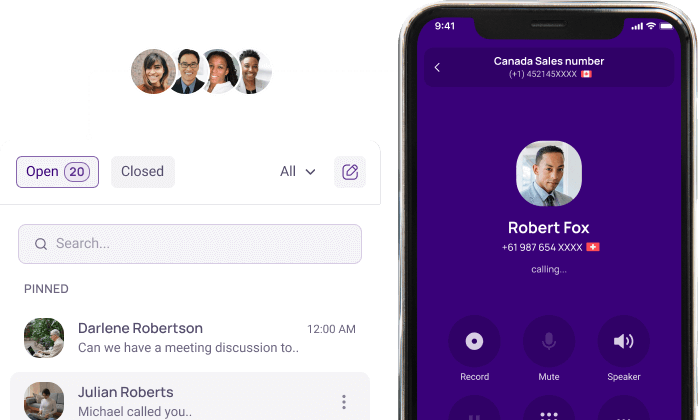
Frequently Asked Questions
Didn’t find the Answer you were looking for? Visit our Help Center or Contact Support
ACD stands for Automatic Call Distribution. It is a telephony system that automatically routes incoming calls to the most appropriate agents or departments based on predefined criteria. It effectively uses skills-based routing, queue management, call monitoring, and reporting to manage calls within the call center environment.
Automatic Call Distribution (ACD) software efficiently manages incoming calls by routing them based on predefined rules and queuing them during busy periods. It distributes calls to available agents, considering factors like skills and priorities.
The bandwidth usage of Automatic Call Distribution (ACD) systems can vary depending on several factors, including the number of concurrent calls, the audio quality settings, and the type of codecs used.
Virtual Automatic Call Distribution (ACD) software offers benefits like flexibility for remote work, managing workload, increased employee productivity, scalability for fluctuating call volumes, cost savings on infrastructure, improved customer experience, and real-time insights for data-driven decision-making.
An Automatic Call Distribution (ACD) system improves a caller’s experience by efficiently routing calls to the right agents, reducing wait times, and providing personalized service. Skill-based routing ensures callers are connected to agents with the relevant expertise, while self-service options offer convenience. Call monitoring and quality assurance contribute to consistent service quality. Overall, ACD systems streamline operations, minimize frustration, and enhance customer satisfaction.
Automatic Call Distribution (ACD) is a telephony system or software used in call centers to efficiently manage and distribute incoming calls to the appropriate agents or departments. ACD systems automate the process of call routing and distribution, ensuring that callers are connected to the most suitable resources based on predefined criteria.
Automatic Call Distribution (ACD) software plays a vital role in call centers. It efficiently routes incoming calls to the appropriate agents or departments, manages call queues during busy periods, and ensures calls are distributed to available agents. ACD software enables real-time monitoring and reporting, empowering supervisors to track agent performance and make data-driven decisions.
To use an Automatic Call Distribution (ACD) system effectively: define your call routing strategy, set up the ACD system, integrate with your telephony system, configure IVR, customize agent availability and skills, monitor and manage queues, analyze reports, train agents, and continuously improve based on insights gained.
An ACD phone system, also known as an Automatic Call Distribution phone system, is a telephony system that handles incoming calls in a contact center or call center environment. It is designed to efficiently route and distribute incoming calls to the most appropriate agents or departments based on predefined rules.
ACD (Automatic Call Distribution) and IVR (Interactive Voice Response) are two distinct components of a call center system. ACD focuses on efficiently routing incoming calls to the appropriate agents based on predefined rules. In contrast, IVR allows callers to interact with automated voice prompts and menus to gather information, select options, or perform certain actions without speaking to an agent.

